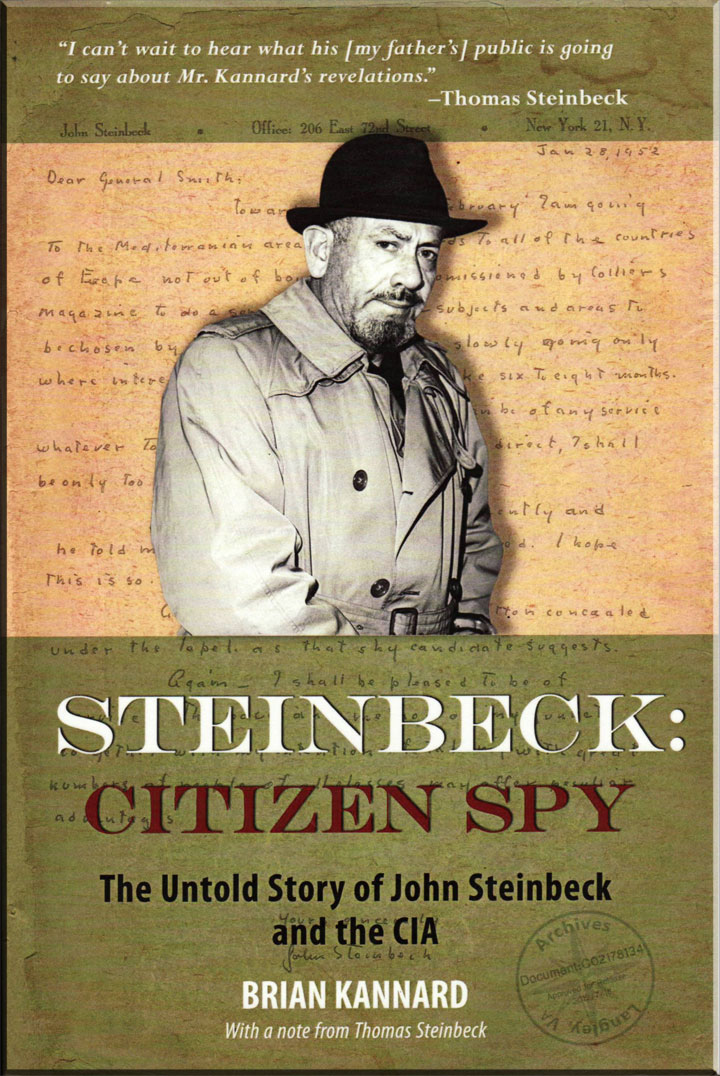 The case for John Steinbeck’s possible connection to the CIA, compellingly presented by literary sleuth Brian Kannard in Steinbeck: Citizen Spy, has been eclipsed by media attention to government shutdown, Washington gridlock, and the national debt-ceiling crisis manufactured by Tea Party Senator Ted Cruz. Too bad. In his new book Kannard provides hard evidence, historical context, and an intriguing hypothesis to explain why John Steinbeck was never called to testify before HUAC (the House Un-American Activities Committee) while fellow artists, former collaborators, and personal friends like Arthur Miller were taking the Fifth, naming names, and being blacklisted for standing up to Cruz’s demagogue role-model, Senator Joseph McCarthy, and McCarthy’s acolytes in the U.S. House of Representatives.
The case for John Steinbeck’s possible connection to the CIA, compellingly presented by literary sleuth Brian Kannard in Steinbeck: Citizen Spy, has been eclipsed by media attention to government shutdown, Washington gridlock, and the national debt-ceiling crisis manufactured by Tea Party Senator Ted Cruz. Too bad. In his new book Kannard provides hard evidence, historical context, and an intriguing hypothesis to explain why John Steinbeck was never called to testify before HUAC (the House Un-American Activities Committee) while fellow artists, former collaborators, and personal friends like Arthur Miller were taking the Fifth, naming names, and being blacklisted for standing up to Cruz’s demagogue role-model, Senator Joseph McCarthy, and McCarthy’s acolytes in the U.S. House of Representatives.
The CIA, HUAC, and Government Shutdown of Freedom
It’s enough to make you wish that the government shutdown had happened 60 years ago, when McCarthy was hunting homegrown communists in the Cold War pumpkin patch.
The subtitle of Kannard’s book—“The Untold Story of John Steinbeck and the CIA”—describes the scope and purpose of his deep investigation into redacted (read censored) pre-government shutdown documents reluctantly delivered to him by the CIA under the Freedom of Information Act. I’m not going to give away the story because it deserves full reading, fair consideration, and frank discussion by Steinbeck lovers everywhere. American progressives owe Kannard a particular debt of gratitude for reopening a shameful chapter in our history, for fighting bureaucratic government shutdown to gain access to undisclosed CIA documents, and for providing a plausible answer to a puzzling question: Did John Steinbeck avoid HUAC by signing up with the CIA?
With the Debt Ceiling Crisis Past, Attention Must Be Paid
Steinbeck’s 25-year paper war with J. Edgar Hoover was first detailed by Thomas Fensch using FBI documents now available online. But Fensch reprinted the redacted contents of Steinbeck’s FBI file without looking for answers to the questions they pose. When I read Fensch’s version, I was struck by the incongruities that motivated Kannard’s research. Wouldn’t the FBI have investigated Steinbeck in advance of the author’s first meeting with FDR, almost five years before Steinbeck’s FBI file begins? Wasn’t it obvious that the 1942 letter written to Hoover by a Florida farmer accusing Steinbeck of being a potential German spy read like a phony put-up job? Didn’t the CIA’s request for the FBI file on Steinbeck—a Nobel Laureate and New York celebrity—seem odd when it occurred so late in the author’s well-publicized career? Was there was more to Steinbeck’s support of America’s war in Vietnam than loyalty to LBJ? George Orwell thought Steinbeck was a closet communist. Kannard’s evidence suggests the opposite conclusion: Steinbeck was a willing CIA operative in the agency’s covert war against communism as early as 1947.
Sluggish response from scholars to Kannard’s book about a Steinbeck-CIA connection isn’t surprising. The academic ship turns slowly. But continued inattention by the mainstream media—post-Edward Snowden and government shutdown—would be harder to understand. With the debt ceiling and government shutdown crisis over for now, Kannard’s book should receive the coverage it deserves. Steinbeck readers, scholars, and admirers have a stake in the outcome. Personally, I’m okay with the idea that John Steinbeck, a classic New Deal liberal at home, did covert “citizen spy” work for the CIA abroad. I’m not sure that every lover of Steinbeck will agree, but to me the CIA story makes sense without making him a villain. Like Thom Steinbeck, quoted on Kannard’s cover, I look forward to finding out what others think.


[…] Federal Bureau of Investigation consider someone like me useful? Readers of Brian Kannard’s book Steinbeck: Citizen Spy are aware of the government’s secret surveillance program called COINTELPRO, a clunky acronym for […]